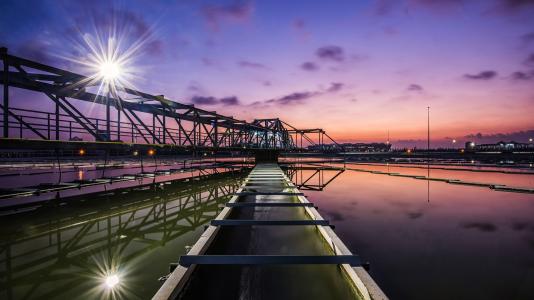Argonne researchers share in Chicago Innovation Award for COVID wastewater testing

The U.S. Department of Energy’s Argonne National Laboratory is among the winners of a 2022 Chicago Innovation Award for its work on a COVID wastewater surveillance system. In collaboration with the Discovery Partners Institute, Argonne researchers assembled one of the first teams in the nation to reliably analyze samples of raw sewage for evidence of SARS-CoV-2 RNA in 2021, providing real-time information to help both the Chicago Department of Public Health and the Illinois Department of Public Health through the pandemic.
In some ways, sewers are the birthplace of epidemiology — the study of disease distribution and patterns in a population. In 1854, John Snow studied a deadly outbreak of cholera in London. He discovered that victims of the outbreak had all consumed water from the Broad Street pump. The water was contaminated with sewage from the River Thames, which contained high concentrations of cholera bacteria. Snow convinced officials to remove the handle from the Broad Street pump, saving countless lives.
“Because of our biosafety expertise, we knew the samples would be safe, but we also knew the researchers would be safe.” — Sarah Owens, sequencing laboratory manager in Argonne’s division of Biological Sciences
But John Snow was only equipped with a map and a primitive microscope. Today, epidemiologists can employ a variety of high-tech tools to take the guesswork out of disease tracking. What’s truly innovative about Argonne’s research is the way researchers can accurately pinpoint specific segments of a virus’s genetic material from a complex sample: sewage.
Argonne’s expertise lies in sequencing the virus’s RNA to track which variants are present in Illinois and to monitor for strains that the Centers for Disease Control and Prevention and World Health Organization have designated as variants of concern. But unlike clinical samples and the at-home tests we’re familiar with, wastewater is more complex. It contains a mixture of several different types of microorganisms.
Sarah Owens, sequencing laboratory manager in Argonne’s division of Biological Sciences, is among the honorees for the Chicago Innovation Award. According to Owens, “We knew that this was going to be a challenge to sequence from wastewater because of the complexity of the community and the nature of the matrix itself. You know it’s dirty. It’s chunky, it has all of these different qualities.”
Think of it as looking for a needle in a haystack made of human waste. Researchers don’t just need to know whether SARS-CoV-2 RNA is present, they need to know which variants are circulating and where.
The success of the project also relies on the network of collaborators across the state, from water treatment plant workers who collect the samples to experts at the University of Illinois Chicago who isolate the genetic material so that Argonne can sequence. Argonne was also ready to support the project because the lab was already equipped with a Biosafety Level 2 laboratory.
“We had a lot of experience working with samples that are potentially infectious in the past. Because of our biosafety expertise, we knew the samples would be safe, but we also knew the researchers would be safe,” said Owens.
Argonne’s work of monitoring wastewater for infectious diseases will continue to be an important and essential tool for public health, not just during the ongoing COVID pandemic, but also as communities prepare for possible outbreaks of everything from flu and RSV to polio and mpox to other emerging diseases. Knowing what diseases are present in the population can help health officials and healthcare providers understand what vaccines, medicines and supplies they might need to treat people and what precautions they should take to keep people safe.
This information can also help public health officials understand the true scope of an outbreak in areas that might not have access to accurate testing data from other sources. Wastewater monitoring during COVID has helped doctors determine if people are infected in a particular area, which strains of the virus are circulating in the area, and even which types of monoclonal antibody treatments would be most effective in treating patients. All of this information translates into lives saved from dangerous and potentially deadly health conditions.
The annual Chicago Innovation Awards is the Chicago region’s foremost recognition of the most innovative new products or services brought to market each year.
The research pilot was funded by the Walder Foundation, and this full-scale project is now being funded by the Illinois Department of Public Health and the Chicago Department of Public Health. It is being led by the University of Illinois-directed Discovery Partners Institute and includes researchers from Argonne, the University of Illinois Chicago, and Northwestern University.
Argonne National Laboratory seeks solutions to pressing national problems in science and technology. The nation’s first national laboratory, Argonne conducts leading-edge basic and applied scientific research in virtually every scientific discipline. Argonne researchers work closely with researchers from hundreds of companies, universities, and federal, state and municipal agencies to help them solve their specific problems, advance America’s scientific leadership and prepare the nation for a better future. With employees from more than 60 nations, Argonne is managed by UChicago Argonne, LLC for the U.S. Department of Energy’s Office of Science.
The U.S. Department of Energy’s Office of Science is the single largest supporter of basic research in the physical sciences in the United States and is working to address some of the most pressing challenges of our time. For more information, visit https://energy.gov/science.